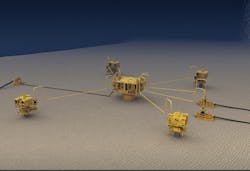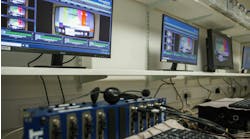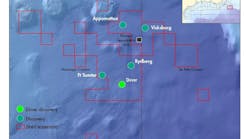Chevron U.S.A. Inc. has contracted OneSubsea, a Schlumberger company, to supply an integrated subsea production and multiphase boosting system for the deepwater Anchor field in the US Gulf of Mexico.
Through this engineering, procurement and construction award, the company will supply vertical monobore production trees and multiphase flowmeters rated up to 20,000 psi. Also included are production manifolds and an integrated manifold multiphase pump station rated to 16,500 psi, subsea controls and distribution.
Awarded in March, this is the first 20,000-psi subsea production system contract in the industry, according to Schlumberger.
The equipment that will be deployed in this project is covered under the 20-year subsea equipment and services master order for Chevron’s development projects in the Gulf of Mexico.
A/S Norske Shell has awarded OneSubsea a frame agreement for an EPCI contract for the Ormen Lange field in the Norwegian Sea. The company and its Subsea Integration Alliance partner Subsea 7 will supply and install a subsea multi-phase compression system.
In the first phase of the project, OneSubsea will do the engineering and design of the complete system. Following the final investment decision by the license group, the complete scope of the EPCI will be executed.
The compression system will be powered and controlled from the Nyhamna onshore gas processing plant, which is 120 km (75 mi) from the subsea location. According to the company, this tieback distance is a world record for transmitting variable speed power from an onshore facility to equipment on the seabed.
The system will be installed in a water depth of 850 m (2,789 ft) and comprises two 16-MW subsea compression stations tied into existing manifolds and pipelines. This multi-phase compression system is said to be surge tolerant, does not require wellstream preprocessing, and adaptable to the varying conditions over the life of the field.
OneSubsea has contracted Nexans to design and supply two 120-km (75-mi) power umbilicals for the subsea multi-phase compression system. Nexans will provide the power umbilicals that will integrate all the 52-kV electrical power, hydraulic and fiber optic elements needed to power and control the compressor station.
The company will perform manufacture in Halden, Norway, with the new cable laying vessel Aurora installing the umbilicals in 2023.
JIP to investigate subsea gas/CO2 separation
Aker Solutions and various major operators are collaborating in a joint industry project on subsea gas separation.
According to the company, studies on injecting carbon dioxide (CO2) to boost recovery and extend the lives of offshore fields have focused on separation of the ‘back-produced’ CO2 from the wellstream on existing platforms. The cost, however, makes the concept economically unattractive.
The new JIP, supported by Total, Pertamina, Equinor and the CO2 Capture Project, involving BP, Chevron and Petrobras, is seeking to identify required membrane qualities for a subsea gas and CO2 separation process. Doing so would minimize pre-treatment requirements and avoid the need for additional large processing modules.
Aker Solutions has developed new concepts for subsea processing of wellstreams from CO2-flooded oil fields, in which CO2-rich gas is separated, compressed, and re-injected into the reservoir. The hydrocarbon-enriched gas is then routed to the topsides production facility.
Gas separation subsea must, however, be performed with sturdy membranes, and the presently qualified operating range for relevant membrane materials do not match the optimal operating conditions for gas separation on the seabed, the company explained.
Testing is therefore necessary to determine membrane performance under these conditions. The SINTEF research institute in Norway will test different membrane qualities under relevant conditions related to pressure, temperature, gas composition and production rates. In addition, technical and economic engineering studies will assess the technology concept based on the results.
The main aims of the project are to:
• Qualify membrane qualities suitable for bulk separation of CO2 in a typical subsea process
• Confirm technical and economic use of subsea processing for offshore CO2 enhanced oil recovery, in combination with reinjection and storage of CO2.
Saipem wins Payara EPCI contract
ExxonMobil has awarded Saipem a wide-ranging subsea construction contract for the proposed Payara development in 2,000 m (6,562 ft) water depth in the Stabroek block off Guyana.
Subject to government approvals and, project sanction by the partners, the company will perform the detailed EPCI of about 130 km (81 mi) of flowlines, rigid risers, associated terminations and jumpers along with the installation of manifolds, flexible risers, dynamic and static umbilicals and flying leads.
Saipem’s FDS2 and Constellation will perform the offshore operations using a combination of J-lay and reel-lay. •





